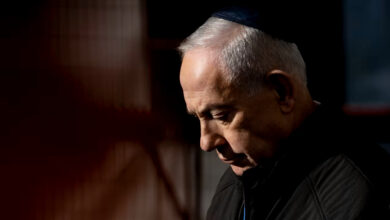Sunday’s front pages are dominated by Thursday’s violence, which saw five Egyptian security personnel killed by Israeli forces during a clash with armed militants in Sinai. With lead reports all around focusing on the rapidly growing sit-in outside the Israeli Embassy in Cairo, now in its third day, independent daily Al-Wafd sums up the situation most accurately, with the headline "Public anger and executive turmoil."
As protesters continue to call for the shutting down of the embassy and the expulsion of the Israeli ambassador, Al-Wafd confirms the eruption of “a war of ambassadors between Egypt and Israel.” According to the paper, Israeli Ambassador Yitzhak Levanon has stated that he will not leave Egypt unless he receives clear orders to do so from the Israeli government. Levanon also called on Egyptian authorities to increase security around the embassy and to “keep preventing protesters from raiding it.”
The paper reports that Yasser Reda, Egypt's Ambassador to Israel, has stated that despite initial announcements made by the Supreme Council of Armed Forces (SCAF), he has not received official orders to leave Tel Aviv.
Al-Wafd also reports that Shalom Cohen, Israel’s previous ambassador to Egypt, arrived in Cairo early Saturday, for “unknown reasons.” Al-Dostour provides further clarification, confirming that Cohen is, in fact, here to “assist Levanon in dealing with the accusations and tensions between the two nations.” Al-Dostour also says that upon arrival at Cairo airport, Cohen was denied entrance to the VIP waiting hall. So that’s justice served then.
Al-Dostour’s headline contradicts Al-Wafd’s report on Reda, stating “Egypt summons its ambassador from Israel for consultations.” The independent daily claims that, according to its sources, Reda will not be returning to his post until Israeli authorities present the results of their investigation into the incident, as well as an official apology.
Adding fuel to an already raging fire is the recent claim that the type of ammunition that killed the Egyptians has been internationally prohibited. Al-Dostour describes it as being “the type that … detonates as soon as it is lodged in the victim’s body.”
In response, several groups have increased their calls for the SCAF to respond to the situation, in varying measures. Military officials have stated their desire to “increase troops in Sinai, review the Camp David treaty, and take the matter to an international criminal court,” while Salafis have called for an open-ended sit-in at the American Embassy as well. Several Islamist groups, on the other hand, have been calling for “the most extreme response possible,” Al-Shorouk reports.
In its lead story, Al-Shorouk reprints the “three demands Egypt has of Israel,” which can be summed up as an official apology, monetary compensation for the victims’ families, and the assurance that “this will never happen again.” However, the independent paper’s “anonymous source” also asserts that Reda will not be summoned back to Egypt, so there goes their credibility.
Al-Shorouk also provides behind-the-scenes details from both sides. Under the headline, “The government in trouble,” the paper reports on the turmoil and “utter confusion” within the ranks of the Egyptian interim government, citing the contradictory announcements regarding Reda as one example. After a summary of the situation, the article’s reporters give up, writing “if the past few sentences seem impenetrable or incoherent, that’s because they perfectly sum up things as they stand now.”
Al-Shorouk’s report also claims that after four hours of deliberation led by Prime Minister Essam Sharaf, the government issued a follow-up statement to Israel, “much stronger in tone” than its first effort. The statement was promptly announced by military officials to the protesters outside the Israeli Embassy, and was reportedly met with cautious approval. Perhaps some suspected it would mysteriously disappear in a matter of hours, which it did. Originally posted on the cabinet’s official website, the statement was soon replaced with a “requested page could not be found” message, and all references to it on state television immediately ceased, even though it had been heavily discussed in the hours following its release.
Regarding the Israeli response to the escalating tension, Al-Shorouk reports that Israeli Prime Minister Benjamin Netanyahu has held a series of cabinet meetings in an attempt to “come to a decision on the best way to deal with the situation,” while Director of Policy and Political-Military Affairs at Israel's Ministry of Defense Amos Gilad has made public statements emphasizing the “essential and fundamental” nature of the Egyptian-Israeli relationship.
Faced with such a inconvenient slew of contradictory reports, details and statements, state-run Al-Ahram shrugs its shoulders and takes the easy way out, contenting itself with a quarter-page summary on its front page. Under the headline “peacekeeping forces in Sinai condemn the Israeli army,” the paper provides some scant details, before going off on a tangent about “all the outlaws roaming around Sinai,” destined to be caught by members of the armed forces. “This campaign will not end,” the report claims, “especially in desert territories, and particularly following the arrest of 20 criminal elements involved in attacks on the Arish police station and highway checkpoints.”
Egypt's papers:
Al-Ahram: Daily, state-run, largest distribution in Egypt
Al-Akhbar: Daily, state-run, second to Al-Ahram in institutional size
Al-Gomhurriya: Daily, state-run
Rose al-Youssef: Daily, state-run
Al-Dostour: Daily, privately owned
Al-Shorouk: Daily, privately owned
Al-Wafd: Daily, published by the liberal Wafd Party
Al-Arabi: Weekly, published by the Arab Nasserist party
Youm7: Weekly, privately owned




